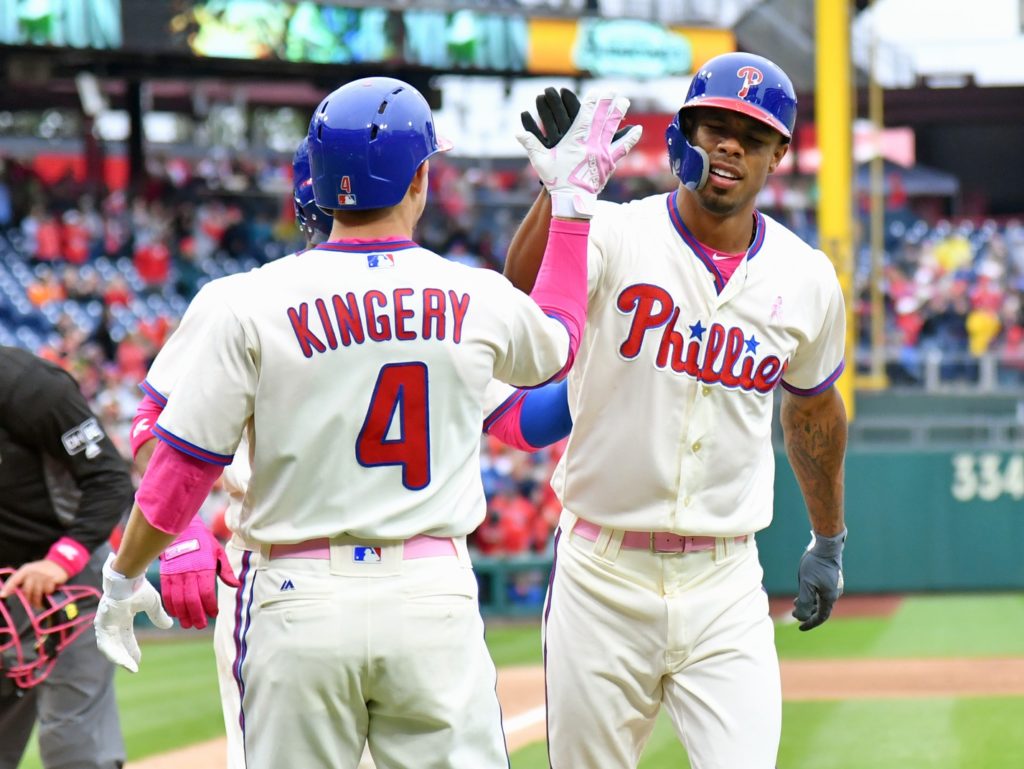Ad Disclosure
The Phillies are Showing an Important Ability to Overcome Adversity
By Bob Wankel
Published:

What will ultimately become of the Phillies as spring turns to summer nobody yet knows, but with the first quarter of the season nearly in the books, there is one truth that has revealed itself through their first 39 games – this team is pretty damn resilient.
Are they inconsistent? Sure. Are they, at times, frustrating to watch? Sunday’s first inning that featured 45 pitches from Jacob DeGrom that, somehow, failed to yield a run should answer that question. In fact, it was a historic tease:
But @SportsInfo_SIS told me after that game that before that, the longest scoreless inning they had in their database was 41 pitches.
That covers the last 17 seasons.
So we know deGrom just had the most pitches in a scoreless inning by any NL pitcher in those 17 seasons.
— Jayson Stark (@jaysonst) May 13, 2018
Neat.
Still, for a young team playing with considerable expectations, but without the experience of dealing with the pressures that come with those expectations, their collective ability to handle adversity has been admirable.
A laughable first week that was headlined by several ill-advised strategical blunders on the part of Gabe Kapler could have derailed their season before it hardly began. No matter. Kapler came back from Crazytown, his bullpen usage normalized, and the team recovered as it eventually raced out to a surprising 14-7 record. That early-season rebound should not be overlooked.
Rewind to that first week. Imagine being a young player told by everybody that you and your teammates were about to embark on a season that would bring relevant baseball back to Philadelphia for the first time in six years. The games begin, your manager pisses away what appeared to be an easy Opening Day win, and then your team gets outscored 29-12 over its first five games. Worse, imagine being Gabe Kapler. You used your bullpen at a record-setting pace, led that Opening Day implosion, inexcusably didn’t provide a reliever a chance to warm up before entering him, and all of baseball is laughing at you after a week on the job. Oh, and the fans are booing the everlasting shit out of you during the home opener as you stroll to the mound to make a routine pitching change:
The fans in Philly were NOT happy when Gabe Kapler came to take out Nick Pivetta after 97 pitches.
There's two down in the sixth after 5.2 innings of scoreless baseball. pic.twitter.com/yAsYHaJe2w
— NBC Sports Philadelphia (@NBCSPhilly) April 5, 2018
This all happens while you desperately need to get a young and impressionable team to buy in to your unorthodox methods. If that were me, there would have been tears behind those aviators.
For as much attention as Kapler’s opening week gaffes received, it’s impressive that both he and the team recovered after such a tumultuous start. But this team’s resolve is evident beyond its early season stabilization or its impressive 11-5 record after a loss. What has been most revealing is how they responded to a pair of miserable late-inning losses over this past week.
Hector Neris’ ninth inning debacle in Washington last Sunday that spoiled what would have most certainly been the Phillies’ best win to date could have sent this team into a tailspin. They instead responded with their first four-game sweep of the Giants in 36 years. It was a thorough beatdown that saw the Phillies outscore San Francisco by a 32-8 margin, and their win streak in the wake of that collapse would have been extended to five games on Friday night had it not been for another Neris meltdown:
Michael Conforto puts the #Mets ahead for good as his two-run home run erases a 1-0 #Phillies lead in the ninth. pic.twitter.com/GDl4O2Q94z
— Today in MLB (@Todayin_MLB) May 12, 2018
The loss dropped the Phillies’ record against the NL East to a dismal 7-14, and it very easily could have caused a hangover that resulted in their seventh series loss in eight tries against division opponents, but it didn’t. They again rebounded yesterday afternoon with a 4-2 comeback victory over the Mets, a win fittingly led by Nick Williams:
When you're in a pinch….
Bring in Nick Williams. 😏 pic.twitter.com/S6l7UNoUvL
— NBC Sports Philadelphia (@NBCSPhilly) May 13, 2018
Williams has experienced his own adversity this season. A year after a promising rookie campaign, the 24-year-old has posted a disappointing .229/.308/.343 slashline through his first 70 at-bats, as he’s watched his playing time significantly decline this year in favor of Aaron Altherr. On this day, his resolve was evident as he seized a crucial opportunity that helped propel his team to an important win. His manager took notice of it:
#Phillies manager Gabe Kapler on Nick Williams who hit another pinch hit HR today in the Phillies win over the Mets@6abc @gabekapler #NickWilliams #BeBold pic.twitter.com/dIg2kmIiNL
— Jeff Skversky (@JeffSkversky) May 13, 2018
We spend a lot of time focusing on numbers when breaking down this game and those who play it, but it’s important to check in with the intangibles from time to time. The numbers will show Odubel Herrera is playing at an MVP-level, Aaron Nola has pitched his way onto the short list of the National League’s best arms, and a deeper study of those numbers will ultimately help us to understand which performances are sustainable and which are not, but what they fail to do is quantify qualities like resiliency or toughness. One does not have to strain their eyes to see that this team is showing both right now, and it’s something to be excited about.
Bob Wankel covers the Phillies for Crossing Broad. He is also the Vice President of Sports Betting Content at SportRadar. On Twitter: @Bob_Wankel E-mail: b.wankel@sportradar.com